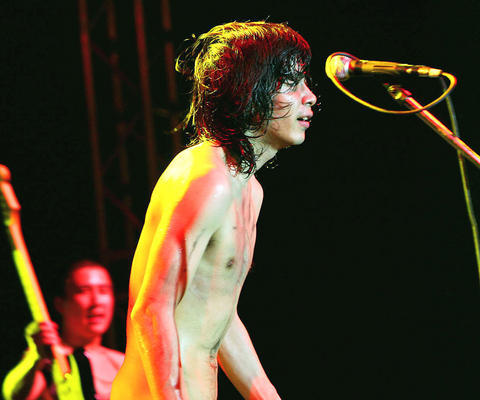Police charged a Japanese rock singer yesterday with violating public decency laws after he briefly stripped on-stage during a concert in Taipei on Saturday night.
Kazunobu Mineta, 29, and his band, the Ging Nang Boyz, were performing as part of the line-up for the three-day Formoz Festival at the Taipei Children's Recreation Center, when Mineta surprised the audience by taking off his shorts for just a few minutes.
Tang Ssu-huai (唐斯懷), the Taipei police officer in charge of the case, told reporters that the police began receiving telephone calls complaining about Mineta's full Monty soon after the incident.

PHOTO: CNA
Police were able to locate Mineta after the concert and took him to a police station for a questioning, Tang said.
Mineta was released by police around 2:30am yesterday.
The Chinese-language United Daily News reported yesterday that Mineta had been "drinking" before he disrobed.
"He had a sip of wine and began taking off his clothes on stage," the newspaper said.
"He later stood all naked on stage for a full minute before retreating to the back stage to put on his shorts," the paper said.
"Some female fans were astonished, but male audiences were thrilled and screamed," the paper said.
Tang said Mineta had told police he was used to taking his pants off while performing in Japan and that he did not know the behavior was illegal in Taiwan.
The singer said he wanted to apologize for his behavior, Tang said.
"With the atmosphere at the concert getting more animated, I became very excited and took my pants off," Tang quoted the singer as saying.
Tang said nudity in public was a violation of public decency.
If convicted, Mineta could face a one-year jail term although the sentence could be commuted to a minimum fine of NT$3,000, the police officer said.
Tang said the police had sent the case to Taipei prosecutors for investigation, and the prosecutors' decision was expected in about two weeks.
Tang said Mineta could leave Taiwan at any time as the singer had not been barred from leaving the country.
Additional reporting by Ap

CHAOS: Iranians took to the streets playing celebratory music after reports of Khamenei’s death on Saturday, while mourners also gathered in Tehran yesterday Iranian Supreme Leader Ayatollah Ali Khamenei was killed in a major attack on Iran launched by Israel and the US, throwing the future of the Islamic republic into doubt and raising the risk of regional instability. Iranian state television and the state-run IRNA news agency announced the 86-year-old’s death early yesterday. US President Donald Trump said it gave Iranians their “greatest chance” to “take back” their country. The announcements came after a joint US and Israeli aerial bombardment that targeted Iranian military and governmental sites. Trump said the “heavy and pinpoint bombing” would continue through the week or as long

TRUST: The KMT said it respected the US’ timing and considerations, and hoped it would continue to honor its commitments to helping Taiwan bolster its defenses and deterrence US President Donald Trump is delaying a multibillion-dollar arms sale to Taiwan to ensure his visit to Beijing is successful, a New York Times report said. The weapons sales package has stalled in the US Department of State, the report said, citing US officials it did not identify. The White House has told agencies not to push forward ahead of Trump’s meeting with Chinese President Xi Jinping (習近平), it said. The two last month held a phone call to discuss trade and geopolitical flashpoints ahead of the summit. Xi raised the Taiwan issue and urged the US to handle arms sales to

State-run CPC Corp, Taiwan (CPC, 台灣中油) yesterday said that it had confirmed on Saturday night with its liquefied natural gas (LNG) and crude oil suppliers that shipments are proceeding as scheduled and that domestic supplies remain unaffected. The CPC yesterday announced the gasoline and diesel prices will rise by NT$0.2 and NT$0.4 per liter, respectively, starting Monday, citing Middle East tensions and blizzards in the eastern United States. CPC also iterated it has been reducing the proportion of crude oil imports from the Middle East and diversifying its supply sources in the past few years in response to geopolitical risks, expanding

Pro-democracy media tycoon Jimmy Lai’s (黎智英) fraud conviction and prison sentence were yesterday overturned by a Hong Kong court, in a surprise legal decision that comes soon after Lai was jailed for 20 years on a separate national security charge. Judges Jeremy Poon (潘兆初), Anthea Pang (彭寶琴) and Derek Pang (彭偉昌) said in the judgement that they allowed the appeal from Lai, and another defendant in the case, to proceed, as a lower court judge had “erred.” “The Court of Appeal gave them leave to appeal against their conviction, allowed their appeals, quashed the convictions and set aside the sentences,” the judges